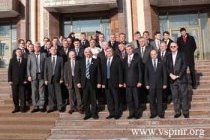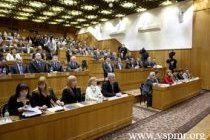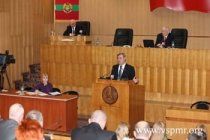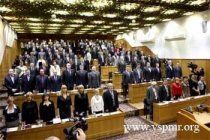 Русский
Русский English
English-







Elections 2010: first plenary meeting of the new convocation
On December 29, 2010, the first plenary meeting of the Supreme Council of the V convocation took place. It was attended by the President of the PMR Igor Smirnov, members of the Cabinet of Ministers, heads of state administrations, chairmen of local Councils of People's Deputies and other guests.
The Chairman of the PMR CEC Pyotr Denisenko made a report on the results of the last elections. He emphasized that the formed composition of the V convocation of the Supreme Council is a reflection of the political will of the Pridnestrovian people. Then the meeting was chaired by the Deputy of all five convocations of parliament, President of the Moldavian Metallurgical Plant CJSC Anatoly Belitchenko. Under his leadership, the agenda was drawn up and a temporary mandate commission was elected. This commission unanimously supported the decision to recognize the powers of the elected deputies of the Supreme Council. This procedure was carried out in accordance with the Constitution of the PMR, before the official election of a new speaker of the Parliament.
Two candidates ran for the post of Chairman of the PMR Supreme Council. Anatoly Kaminsky and Yevgeny Shevchuk - both were speakers of the Parliament in the previous IV convocation. According to the results of an open vote, Anatoly Kaminsky was elected Chairman of the PMR Supreme Council of the V convocation.
At the first meeting, the Head of state Igor Smirnov in his report noted the main tasks facing the new deputy corps. He recommended that parliamentarians take into account the experience of their predecessors, first of all, with regard to the quality of the adopted legislative acts. Igor Smirnov emphasized that the effectiveness of the parliament's work should be determined not by the number of adopted laws, but by their quality.
The second plenary session of the PMR Supreme Council took place on January 19, 2011. Speaker of the Parliament Anatoly Kaminsky outlined the priority areas in the work of the legislature of the V convocation. He identified as the main ones the development of draft laws in the field of improving the quality of life of Pridnestrovians, attracting and implementing investment projects, modernizing the management system and maintaining the continuity of the strategic course, which is based on the recognition of our republic. In the economic area, the main thing was to expand state support for the sectors of the economy, which should become a "safety cushion" for the budget system, the monetary sphere and employment.
The Parliament Speaker focused on the process of further improvement of legislative activity. He explained that in the IV convocation, 2586 legislative initiatives were submitted to the Supreme Council for consideration. 45.5% of them are represented by deputies, 30.5% by the President, 2% by the judiciary and the prosecutor's office, and 22% by other subjects of legislative initiative.
At the time of the start of the V convocation of the Supreme Council, 318 legislative initiatives were under consideration, 135 of which and this is 42% of the total, were considered in the first reading. There were also legislations left over from previous convocations.
The deputy corps at the second plenary session considered issues related to the election of deputy heads of Parliament, definition of its structure, formation of the numerical and personal composition of new committees and commissions. The deputies elected two Deputy Chairmen of the PMR Supreme Council. They were Mikhail Burla and Sergey Cheban - they were in charge of issues in the field of economics and social policy. In the 5th convocation of the Pridnestrovian Parliament, seven committees and three commissions continued their work. Each committee consisted of five to seven deputies. In general, all parliamentary committees consisted of management, departments and specialists. For example, the Committee on Legislation, Law Enforcement, Security, Defense, Protection of the Rights and Freedoms of Citizens consisted of three departments: a department for constitutional law, rights and freedoms of citizens, a department for law enforcement, security and defense, and a department for anti-corruption policy. Each committee had departments responsible for a certain direction.





